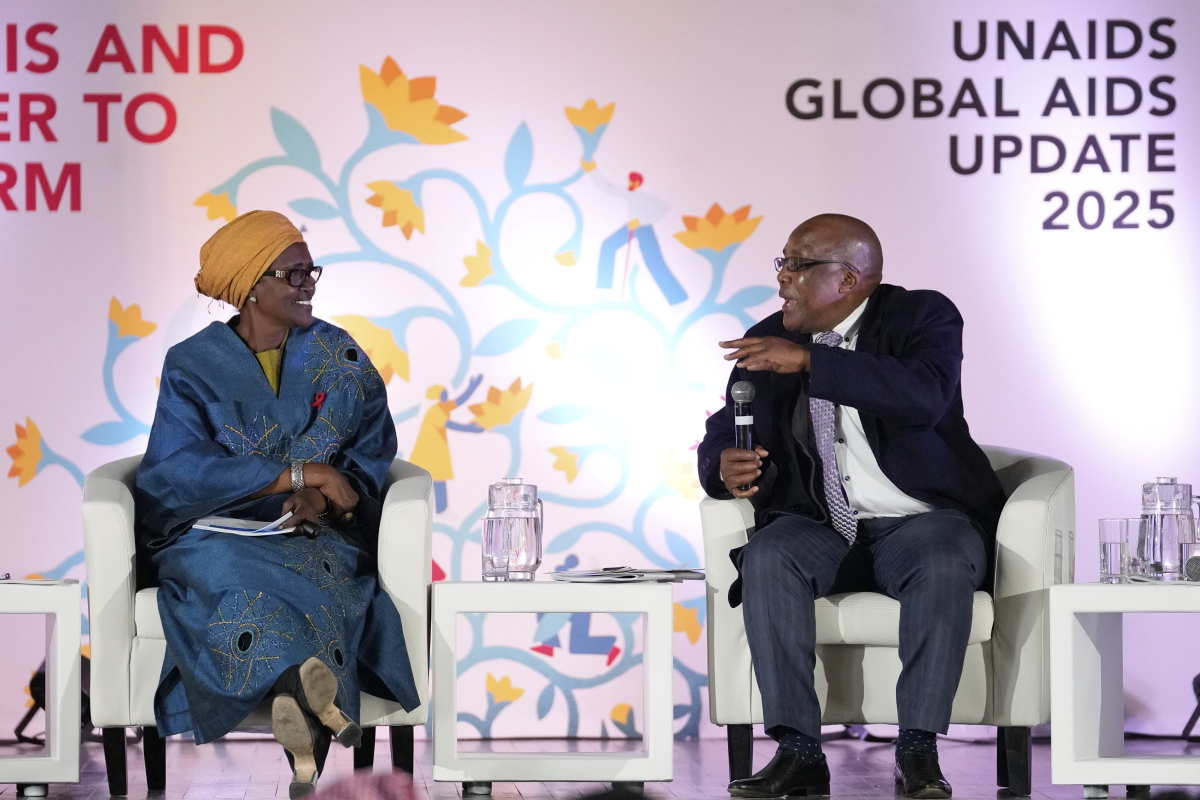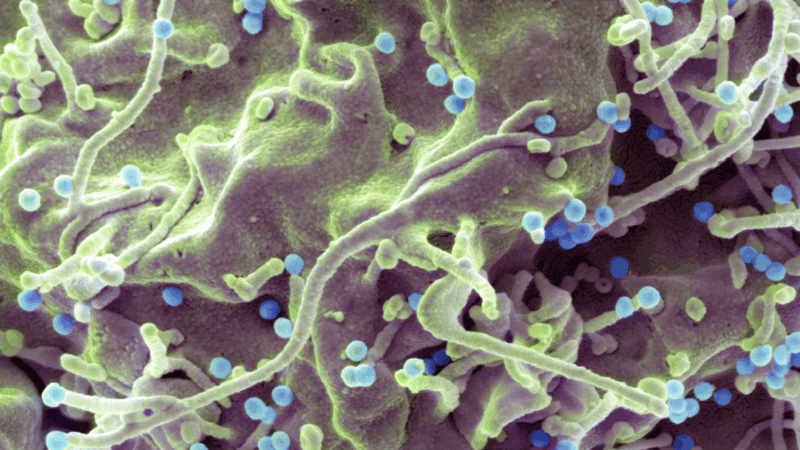UNAIDS report warns HIV progress at risk as U.S. funding cuts take hold
JOHANNESBURG, South Africa — Decades of progress in the fight against HIV/AIDS are in danger of unraveling, the United Nations Aids Agency (UNAIDS) warned Thursday in its annual report, citing sharp funding cuts from major donors.
The report, launched in South Africa by UNAIDS, says those cuts — especially the sudden withdrawal of U.S. funding — are threatening to reverse gains that have saved millions of lives over the past two decades.
“If the world doesn’t plug this hole,” said Winnie Byanyima, executive director of UNAIDS, “we estimate that an additional six million people will be newly infected in the next four years. We could have four million additional AIDS-related deaths.”
The reports warning comes five months after the Trump administration halted most funding for the President’s Emergency Plan for AIDS Relief (PEPFAR) — the largest single contributor to the global HIV/AIDS response. The decision was made with little warning.
“The sudden withdrawal of the single biggest HIV donor is putting this progress at risk,” Byanyima said during a press briefing in Johannesburg.
Since the start of the epidemic, UNAIDS says 26.9 million lives have been saved through treatment efforts — many of them in sub-Saharan Africa, the region most affected by the virus.

Fallout in South Africa and beyond
South Africa, which has the world’s largest population of people living with HIV, has made major strides. Most of those infected now receive life-saving antiretroviral drugs.
But the fallout is already being felt. At the report’s launch, South Africa’s Health Minister Aaron Motsoaledi called the U.S. cuts “a wake-up call” — and warned of the dangers of depending on a single donor.
“This type of relationship where we depend on one country, and when that country is in some type of negative mood, the whole world collapses — yes, it’s scary,” he said.
Scientific setbacks and a call to action
South African researchers have been at the forefront of global HIV breakthroughs as well as COVID-19 studies. But many trials are now being suspended due to lack of funds.
Dr. Helen Rees, head of the Wits Reproductive Health and HIV Institute in Johannesburg, said the implications are global.
“The research being done for HIV and tuberculosis in South Africa has not only had an impact here, but a huge global impact,” she said.
Rees was recently honored by the World Health Organization for her “outstanding contribution to public health,” but her institute is now facing major U.S. funding cuts.
“Not charity” — a shared fight
Trump has said the shift away from U.S. aid reflects a new emphasis on “trade over charity” in Africa. But UNAIDS’ Byanyima says the sudden withdrawal of U.S. support in February has left UNAIDS with nearly 50% less funding — and no time to prepare for the gap.
“This is not charity,” she said. “This is solving a global problem together. As long as it festers in some parts of the world, it will come back to hit everybody else.”
For longtime HIV activist Nombeko Mpongo in Cape Town, the cuts have felt deeply personal.
“I remember for a few days I felt suffocated, I felt like being choked… It was like a volcano came and took everything away. It felt like a death penalty,” she said.
But after the shock, Mpongo says she rallied.
“I realized — no man, nonsense. Let me fight. Let me reach out to the communities,” she said. “We’ve fought this virus before. We’ll do it again, because hope is what is going to carry us through.”
Transcript:
SCOTT DETROW, HOST:
Decades of progress made on preventing and treating HIV/AIDS could be reversed by major funding cuts. That warning comes from the United Nations, which issued a new report today. It comes about five months after the U.S. halted much of its global HIV funding almost overnight. Africa is the region with the biggest population of people living with HIV and stands to see the most immediate impact, but experts say the fallout will be global, as Kate Bartlett in Johannesburg explains.
KATE BARTLETT, BYLINE: The U.S. was the biggest global donor towards HIV treatment and prevention under the President’s Emergency Plan for AIDS Relief, or PEPFAR. Since the start of the epidemic, almost 27 million deaths have been averted through treatment, UNAIDS says.
(SOUNDBITE OF ARCHIVED RECORDING)
WINNIE BYANYIMA: The sudden withdrawal of the single biggest HIV donor is putting this progress at risk.
BARTLETT: That’s UNAIDS executive director Winnie Byanyima speaking at the launch of the report in Johannesburg on Thursday.
(SOUNDBITE OF ARCHIVED RECORDING)
BYANYIMA: If the world doesn’t plug this hole, we estimate that an additional 6 million people will be newly infected in the next four years. We could have 4 million additional AIDS-related deaths.
BARTLETT: In South Africa, which has one of the largest numbers of people living with HIV in the world, huge strides have been made, with most infected people now on antiretroviral drugs. The country’s health minister, Aaron Motsoaledi, called the U.S. cuts a, quote, “wake-up call.”
(SOUNDBITE OF ARCHIVED RECORDING)
AARON MOTSOALEDI: This type of relationship, where we depend on one country, and when the country is in some negative mood, the whole world collapse – yes, it’s scary.
BARTLETT: Motsoaledi stressed an end to the epidemic could be near, but it requires access to new preventative drugs. South African scientists have been among the foremost researchers of HIV, participating in groundbreaking studies that benefit the international community. They were also major contributors to global research during the COVID-19 pandemic. But many clinical trials have now been stopped midway. Helen Rees, director of research institute Wits RHI in Johannesburg, said this is not only a blow for Africa.
HELEN REES: The research that’s been done for HIV, for TB in South Africa has had not only an impact for the country but huge global impact as well.
BARTLETT: Rees is this year’s winner of a major World Health Organization award for, quote, “outstanding contribution to public health.” Still, her institute is facing major U.S. funding cuts. President Trump has said the U.S. is moving away from a focus on aid to trade in its relations with Africa. The withdrawal of U.S. support in January means UNAIDS has lost close to 50% of its funding, according to the organization’s head, Byanyima, with no time to plan for the shortfall.
(SOUNDBITE OF ARCHIVED RECORDING)
BYANYIMA: As long as it festers in some parts of the world, it will come back to hit everybody else. This is not charity. This is solving a global problem together.
BARTLETT: In the months since Trump’s announcement, NPR has been speaking to ordinary South Africans affected. In Cape Town, I spoke to Nombeko Mpongo, a community AIDS activist who got the virus after being gang-raped. I asked her how she felt when she first heard about the U.S. cuts.
NOMBEKO MPONGO: I remember for a few days I felt suffocated. For me, it was like a volcano came and took everything away. And for me, it felt like a death penalty.
BARTLETT: But after the initial shock, she rallied.
MPONGO: I realized, let me fight. Let me reach out to the communities because hope is what is going to carry us through.
BARTLETT: She says Africans have fought this disease before, and they’ll do it again.
For NPR News, I’m Kate Bartlett in Johannesburg.
A new one-a-day-pill holds promise for HIV’s ‘forgotten population’
It's designed to take the place of complicated, multiple drug regimens that many people with HIV need to follow. And it's also beneficial because the HIV virus is always evolving.
For filmmaker Chloé Zhao, creative life was never linear
Director Chloé Zhao used meditation, somatic exercises and dance to inspire the cast and crew of this Oscar-nominated story about William Shakespeare's family.
10 new books in March offer mental vacations
March is always a big one for books – this year is no different. We call out a handful of upcoming titles for readers to put on their radars — offering a good alternative to doomscrolling.
Sen. Chris Coons, D-Del., talks about the war with Iran and upcoming war powers vote
NPR's A Martínez asks Delaware Democrat Chris Coons, a member of the Senate Foreign Affairs Committee, about the war with Iran.
The candy heir vs. chocolate skimpflation
The grandson of the Reese's Peanut Butter Cups creator has launched a campaign against The Hershey Company, which owns the Reese's brand. He wants them to stop skimping on ingredients.
Scientists make a pocket-sized AI brain with help from monkey neurons
A new study suggests AI systems could be a lot more efficient. Researchers were able to shrink an AI vision model to 1/1000th of its original size.







